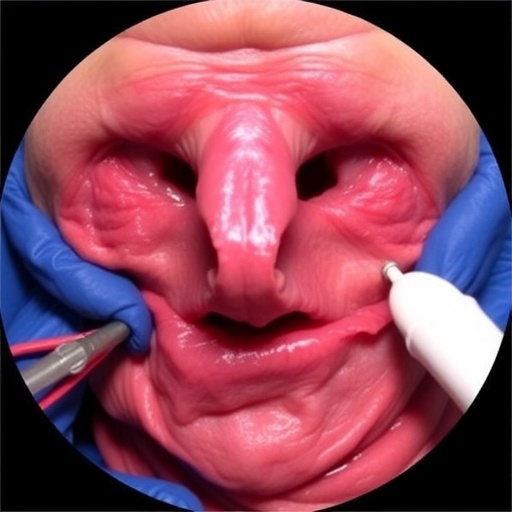In a remarkable development in pediatric surgery, researchers have shed light on the promising outcomes of laparoscopic-assisted anoplasty for treating rectovestibular fistula, particularly in its intermediate type. This surgical approach has become a focal point of study for its potential to transform procedures that weren’t previously as effective. The essence of the study, led by Tang et al., unharnesses an innovative tapestry of surgical methodology that challenges the existing paradigms in treating this complex condition prevalent among females.
The study emphasizes the anatomy of the rectovestibular fistula, a malformation that connects the rectum to the vestibule of the vagina, creating a conduit of fecal matter entering the vagina. It poses numerous challenges for affected individuals, significantly impacting their quality of life and leading to both physical and psychological distress. Traditional surgical methods for address this anomaly have often yielded unsatisfactory results, prompting the search for newer, less invasive techniques.
Laparoscopic surgery, renowned for its minimally invasive nature, reduces recovery time and postoperative complications compared to conventional open surgery. This study indicates how laparoscopic-assisted anoplasty could enhance the surgical experience for these young patients. By utilizing small incisions, the technique minimizes tissue trauma, leading to quicker healing and less postoperative pain. Such advancements in pediatric surgical care are pivotal and highlight a shift towards less invasive approaches in the surgical management of congenital anomalies.
In the reported study, a cohort of pediatric patients diagnosed with intermediate type rectovestibular fistula underwent laparoscopic-assisted procedures. The results were analyzed in terms of efficacy, recovery times, and overall patient satisfaction post-surgery. With detailed metrics and evaluations incorporated, the findings provide a robust framework that supports the efficacy of these laparoscopic interventions. The study notes the significance of early diagnosis and surgical intervention as crucial in improving the outcomes for these children.
The intricacy of the procedure requires an adept surgical team well-versed in the nuances of laparoscopic techniques. Surgeons must navigate the delicate anatomy of the perineum and the encompassing structures to ensure proper reconstruction of the anal canal. The authors of the study elucidate the technical steps required in performing the anoplasty and how adeptness in these procedures is critical to minimizing complications such as infection or leakage. It becomes evident that specialized training and experience are indispensable to the success of laparoscopic-assisted techniques.
Moreover, the psychological implications for children undergoing such procedures cannot be overlooked. The study highlights the importance of a multidisciplinary approach, integrating psychological support as part of the surgical management and postoperative care. The experience of being diagnosed with a congenital condition followed by surgical intervention can be overwhelming for both patients and their families. Therefore, providing comprehensive care that addresses emotional wellness alongside physical surgical recovery enriches the overall treatment experience.
Following the surgical procedures, researchers measured outcomes based on clinical follow-ups, where improvements in quality of life were reported among the participants. Many families expressed relief and gratitude, noting significant improvements in their daughters’ physical health and social interactions. Such testimonies amplify the importance of effective surgical interventions in transforming lives, validating the ongoing exploration and refinement of laparoscopic techniques in pediatric surgery.
Another salient point raised in the study is the financial aspect of surgical interventions for congenital conditions. Laparoscopic surgeries generally incur higher initial costs due to the specialized instruments and technology involved. However, Tang et al. argue that the long-term benefits, including decreased hospital stays and reduced complications requiring further interventions, can offset these costs. Such economic considerations are crucial when evaluating the feasibility of integrating innovative surgical techniques into standard practice.
Furthermore, the study also presents a thorough comparison to traditional methods, outlining how the advancements offered by laparoscopic-assisted anoplasty could revolutionize the management of rectovestibular fistula. Not only do these techniques boast improved recovery times, but they also align with contemporary standards of patient-centered care, advocating for solutions that prioritize the well-being of the pediatric population.
As the research disseminates, it is incumbent upon the medical community to absorb and translate these findings into clinical practice. Surgeons are encouraged to consider the implications of this work, integrating laparoscopic techniques into their repertoire for similar cases. Continued education, collaborative research, and sharing of best practices will serve to bolster the surgical landscape, ultimately benefiting prospective patients.
In retrospect, the study by Tang et al. stands as a significant contribution to the field of pediatric surgery, illuminating the path towards improved management of rectovestibular fistula using advanced surgical techniques. The innovative approach not only mitigates the inherent challenges posed by this condition but also embodies a more humane, less traumatic way of addressing pediatric surgical needs. As more healthcare professionals adopt these methodologies, it becomes clear that the future of pediatric surgery is indeed promising and primed for transformative outcomes.
In conclusion, as this research grabs attention both in medical and public domains, one must acknowledge the potential it holds for reshaping pediatric surgical care. With ongoing studies and refinements, the hope remains that laparoscopic-assisted anoplasty will become a standard procedure, providing children with a renewed sense of health and normalcy.
Subject of Research: Laparoscopic-assisted anoplasty for the treatment of intermediate type rectovestibular fistula
Article Title: Efficacy of laparoscopic assisted anoplasty in the treatment of intermediate type rectovestibular fistula
Article References:
Tang, C., Liu, Y., Zheng, Z. et al. Efficacy of laparoscopic assisted anoplasty in the treatment of intermediate type rectovestibular fistula.
BMC Pediatr 25, 849 (2025). https://doi.org/10.1186/s12887-025-06212-4
Image Credits: AI Generated
DOI: 10.1186/s12887-025-06212-4
Keywords: Laparoscopic Surgery, Pediatric Surgery, Rectovestibular Fistula, Anoplasty, Congenital Anomalies, Surgical Techniques, Patient Care




